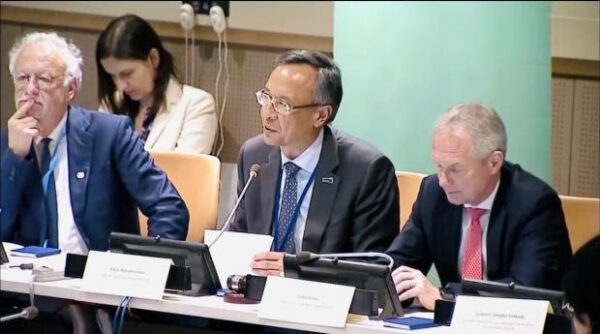OSCE High Commissioner on National Minorities, the UN and regional organizations discuss co-operation, integration and engagement with women and youth
NEW YORK, 30 May 2023 – At the United Nations (UN) Headquarters in New York, a high-level event was organized by the OSCE High Commissioner on National Minorities in close co-operation with the UN Special Rapporteur on Minority Issues, and the Permanent Mission of the Republic of North Macedonia to the UN, and the Permanent Mission of the Republic of Poland to the UN, representing the OSCE Chair and its Troika, respectfully.
The event set the stage for an insightful discussion about the sustainable integration of diverse societies. Marking the 30th anniversary of the first OSCE High Commissioner on National Minorities, Max van der Stoel, assuming his duties and the opening of the HCNM office in The Hague, regional models of preventive diplomacy were discussed with the participation of several other regional organizations and the UN.
“My main message to all governments is to recognize diversity as an asset and source of strength in their societies and communities. From my observations, increasing the participation of national minority youth and women in all aspects of public life has a positive impact on strengthening integration and cohesion within society,” said High Commissioner on National Minorities, Kairat Abdrakhmanov. “On occasions such as this, when we take a moment to discuss how to capitalize on our different roles, we learn a great deal from our respective experiences in conflict prevention. It also gives us the space to generate new ideas and forge new alliances,” he added.
The event brought together a broad range of multilateral institutions and their representatives, including Assistant Secretary General Nestor Mendez of the Organization of American States and Hameed Ajibaiye Opeloyeru, Permanent Observer of the Organization of Islamic Cooperation, to reinforce partnerships on approaches to conflict prevention. The event builds on a well-established tradition, initiated in 2018 between the OSCE HCNM and partners at the UN, to hold joint engagements in the margins of the UN General Assembly. This year, the President of the UN General Assembly, Csaba Kőrösi, delivered the opening remarks at the start of the event together with the co-hosts.
Ljubomir Danailov Frchkoski, Permanent Representative of the Republic of North Macedonia to the UN, and representing the 2023 OSCE Chairpersonship, stressed that “The nature of conflicts is shifting: today, cultural conflicts are often tied up with identity issues, discrimination, hate speech and propaganda – spread by social media – with the aim of striking fear in the heart and mistrust towards migrants, refugees, and the cultural ‘other’. We see this in increasing acts of anti-Semitism and Islamophobia within the EU and on its borders.” “Facing this challenge with neutral, passive and pale multilateralism is not an option! All of us here today – international actors together with local initiatives – need to make a stand. Let us strive for inclusivity and gender equality, especially for vulnerable groups. Serious energy and efforts are needed to expose fake news, conspiracy theories, and hate speech which spread fear,” he said.
Krzysztof Maria Szczerski, Permanent Representative of the Republic of Poland to the UN, representing the 2022 OSCE Chairpersonship, went on to emphasize that “Conflict prevention efforts often go unnoticed by the headlines, yet their primary objective is to ensure that crises never escalate to that level.” “Poland firmly believes that preventive diplomacy is a crucial tool in maintaining peace and stability in our increasingly interconnected world. Rather than waiting for conflicts to escalate and lives to be lost, it is imperative that we take proactive measures to prevent conflicts from arising in the first place,” he said.
In his address, Fernand de Varennes, UN Special Rapporteur on Minority Issues, reminded us that: “Preventive diplomacy must keep up with the changing landscape of modern conflicts and focus on addressing the grievances of minorities in areas such as socio-economic and public participation – failure to do so is reflected in a more unstable, violent and conflict-prone world.”
Panellists, including Alice Wairimu Nderitu, UN Under-Secretary-General & Special Adviser of the Secretary-General on the Prevention of Genocide and Ilze Brands Kehris, UN Assistant Secretary-General for Human Rights, shared their perspectives on how the UN and regional organizations can work together to amplify the impact of their efforts in preventive diplomacy. In addition, Paivi Kaarina Kannisto, Chief of Peace and Security at the UN Women called for decision-makers to meaningfully engage with national minority women and youth, including when designing policies focused on integration and the effective participation of all members of society in public life and the socio-economic sphere.
Participants reiterated their commitment to continue engaging in active dialogue, and share experiences and best practices to build an enabling environment to promote peace and security.
